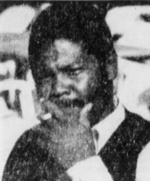 GNS Photo On July 7, 1973, the nude body of Earlene Treva Barksdale, 34, the wife of a prominent attorney, was found in the back office of her children’s clothing store, Just Kids Shoppe, located in North Tampa, Florida. She had been raped and shot in the head, and about $100 was missing from the store. The bullet found below her left ear was later determined to be a bullet from a “.38 special” revolver. There were no fingerprints found. Tests of body fluids to determine who had raped Barksdale were inconclusive, but suggested two separate assailants. On that same day, Joseph Green Brown (also known by his Swahili name, Shabaka WaQlimi) and Robert Floyd committed a different robbery at a nearby Holiday Inn. After the robbery, Brown turned himself in and implicated Floyd to the police. Brown was originally from Charleston, South Carolina. He relocated to Florida from Charleston, where his mother resided, only a few months before his arrest. Encouraged by friends, he moved to Orlando to find employment. When that failed, he moved on to Tampa, believing there would be more opportunities. Brown said he regretted that move because it put him in contact with Floyd, who introduced him to “people I didn’t have any business being with, and the next thing I know, I’m in jail charged with murder.” Brown was arrested after surrendering to the police in connection with the Holiday Inn robbery. The similarities between the robbery and the Barksdale murder case were strong, and when these similarities were combined with statements made by Floyd, who was in police custody in connection with yet another robbery and angry at Brown for implicating him in the Holiday Inn crime, the police charged Brown with murder. On July 3, 1974, after a five-day trial before an all-white jury, Brown, a 23-year-old black man, was convicted of first-degree murder, rape and robbery. The prosecutor, Robert Bananno, misled the jury by telling them that Brown’s .38-caliber handgun was the same weapon used to kill Barksdale, although FBI ballistic tests eliminated that possibility. Further, the State provided Brown with an inexperienced and underpaid counsel, Michael J. Shea. The prosecution’s case rested on the testimony of Floyd, who fabricated Brown’s involvement in the murder case as revenge for turning him in on the Holiday Inn robbery. The entire case hinged on Floyd’s testimony that Brown had admitted killing and raping the victim. In exchange for this testimony, Floyd received a generous plea agreement from the prosecution, which excluded him from charges in connection with the Barksdale murder. At the trial, Floyd told the jury that he had made no such arrangement with the prosecution, and the prosecutor included Floyd’s denial in his closing arguments.
Although he had no prior problems with the law, Brown received the death sentence on his murder conviction, and two consecutive life sentences on the robbery and rape convictions.
In March 1975, eight months after the trial, while still in prison on an unrelated robbery charge, Floyd recanted his testimony against Brown. He submitted an affidavit to Brown’s attorney explicitly stating that his testimony about the crime and the denial of a plea agreement were entirely false. The enraged prosecutor threatened Floyd with a perjury prosecution, so he recanted most of the statements in the affidavit. However, Floyd did not recant his statement about receiving a favorable plea agreement. It took eleven years for Brown to be awarded a new trial. In October 1983, he came within 15 hours of execution. A stay ordered by the federal court saved his life. Finally, on October 17, 1986, the 11th Circuit Federal Court of Appeals reversed Brown’s conviction, stating that the State knowingly allowed the introduction of false testimony at trial, failed to make the falsity known, and allowed the prosecution to exploit the testimony in the closing argument to the jury, violating the due process clause of the Fourteenth Amendment. The Court ordered a new trial, but the prosecution concluded they lacked evidence to prove the original murder charge and dropped all charges against Brown. Brown was released on March 5, 1987. Brown’s attorney, asked to comment on his client’s release, told the press: “If people would just stop and think about what happened here. We almost executed an innocent man.” Brown, who was released without compensation, told reporters that he planned to work with death penalty opponents and speak out against prosecutorial misconduct. In the years that followed, he did just that, speaking to schools, churches and other groups and publications about his experiences and his opposition to the death penalty. He married and spent much of his time with his wife’s children and grandchildren, but he reported that he continually struggled to obtain employment because his capital conviction had not been expunged from his record. In 2012, Brown’s wife of twenty years, Mamie Caldwell Brown, was found murdered in their home. On September 12, 2013, Brown was convicted of this murder. - Kathryne Grendon and Daryl Drabinsky
|